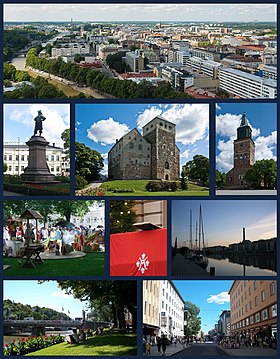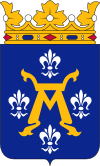Turku, Finland
|
Turku Turku – Åbo |
|||
|---|---|---|---|
| City | |||
|
Turun kaupunki Åbo stad City of Turku |
|||

Top row: Aerial view of Turku from atop Turku Cathedral
2nd row: Statue of Per Brahe, Turku Castle, Turku Cathedral 3rd row: Turku Medieval Market, The Christmas Peace Balcony of Turku, Twilight on the Aura River Bottom row: Summer along the Aura River, view of Yliopistonkatu pedestrian area |
|||
|
|||
 |
|||
| Coordinates: 60°27′N 022°16′E / 60.450°N 22.267°ECoordinates: 60°27′N 022°16′E / 60.450°N 22.267°E | |||
| Country |
|
||
| Region |
|
||
| Sub-region | Turku sub-region | ||
| Government | |||
| • Mayor | Aleksi Randell | ||
| Area (2016-01-01) | |||
| • City | 245.67 km2 (94.85 sq mi) | ||
| • Land | 245.67 km2 (94.85 sq mi) | ||
| • Water | 60.7 km2 (23.4 sq mi) | ||
| • Urban | 252.65 km2 (97.55 sq mi) | ||
| • Metro | 2,331.1 km2 (900.0 sq mi) | ||
| Area rank | 247th largest in Finland | ||
| Population (2016-03-31) | |||
| • City | 186,030 | ||
| • Rank | 6th largest in Finland | ||
| • Density | 757.24/km2 (1,961.2/sq mi) | ||
| • Urban | 252,468 | ||
| • Urban density | 999,3/km2 (25,880/sq mi) | ||
| • Metro | 315 751 | ||
| Population by native language | |||
| • Finnish | 88.1% (official) | ||
| • Swedish | 5.2% (official) | ||
| • Others | 6.7% | ||
| Population by age | |||
| • 0 to 14 | 13.1% | ||
| • 15 to 64 | 69.5% | ||
| • 65 or older | 17.4% | ||
| Time zone | EET (UTC+2) | ||
| • Summer (DST) | EEST (UTC+3) | ||
| Postal code | 20000–20960 | ||
| Municipal tax rate | 18.75% | ||
| Website | www.turku.fi | ||
Turku (Finnish pronunciation: [ˈturku]; Swedish: Åbo [ˈoːbʊ]) is a city on the southwest coast of Finland at the mouth of the Aura River, in the region of Southwest Finland. Turku, as a town, was settled during the 13th century and founded most likely at the end of the 13th century, making it the oldest city in Finland. It quickly became the most important city in Finland, a status it retained for hundreds of years. After Finland became part of the Russian Empire (1809) and the capital of the Grand Duchy of Finland was moved to Helsinki (1812), Turku continued to be the most populous city in Finland until the end of the 1840s, and it remains a regional capital and an important business and cultural center.
Because of its long history, it has been the site of many important events, and has extensively influenced Finnish history. Along with Tallinn, the capital city of Estonia, Turku was designated the European Capital of Culture for 2011. In 1996, it was declared the official Christmas City of Finland.
Due to its location, Turku is a notable commercial and passenger seaport with over three million passengers traveling through the Port of Turku each year to and Mariehamn.
As of 31 December 2016, the population of Turku was 187,564, making it the sixth largest city in Finland. There were 318,168 inhabitants living in the Turku sub-region, ranking it as the third largest urban area in Finland after the Greater Helsinki area and Tampere sub-region. The city is officially bilingual as 5.2 percent of its population identify Swedish as a mother-tongue.
...
Wikipedia


